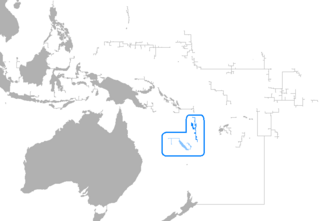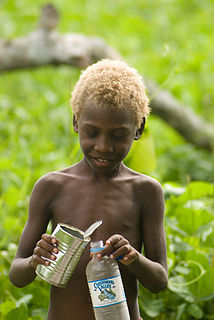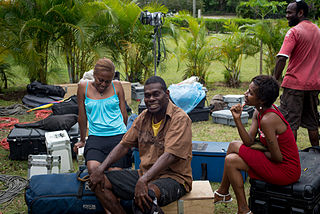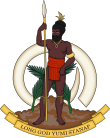Related Research Articles

Bislama is an English-based creole language and one of the official languages of Vanuatu. It is the first language of many of the "Urban ni-Vanuatu" and the second language of much of the rest of the country's residents. The lyrics of "Yumi, Yumi, Yumi", the country's national anthem, are composed in Bislama.
"Yumi, Yumi, Yumi" is the national anthem of Vanuatu. It was written and composed by François Vincent Ayssav and adopted by the citizens of Vanuatu in 1980.
Postcolonial literature is the literature by people from formerly colonized countries. It exists on all continents except Antarctica. Postcolonial literature often addresses the problems and consequences of the decolonization of a country, especially questions relating to the political and cultural independence of formerly subjugated people, and themes such as racialism and colonialism. A range of literary theory has evolved around the subject. It addresses the role of literature in perpetuating and challenging what postcolonial critic Edward Said refers to as cultural imperialism.

Francophone literature is literature written in the French language. The existence of a plurality of literatures in the French language has been recognised, although the autonomy of these literatures is less defined than the plurality of literatures written in the English language. Writings in the French language from Belgium, Canada and Switzerland were recognised as belonging to distinct traditions long before writings from colonial territories of France. Writing in French by Africans was formerly classified as "colonial literature" and discussed as part of colonial studies for its ethnographical interest, rather than studied for its literary merit. Any texts in French from the colonies and territories that were considered to have merit were subsumed under the classification of French literature. The nature and importance of Francophone literature in various territories of the former French Empire depends on the concentration of French settlers, the length of time spent in colonial status, and how developed indigenous languages were as literary languages. It was only following the Second World War that a distinction started to be made in literary studies and anthologies between French literature and other writing in French. In 1960 Maurice Bémol published Essai sur l'orientation des littératures de langue française au XXe siècle; the plural in the title emphasised the study's new approach of examining the level of autonomy of the languages.
African literature is literature from Africa, either oral ("orature") or written in African and Afro-Asiatic languages. Examples of pre-colonial African literature can be traced back to at least the fourth century AD. The best-known is the Kebra Negast, or "Book of Kings."

Ni-Vanuatu is a large group of closely related Melanesian ethnic groups native to the island country of Vanuatu. As such, Ni-Vanuatu are a mixed ethnolinguistic group with a shared ethnogenesis that speak a multitude of languages.
The Republic of Vanuatu has the world's highest linguistic density per capita.

Albert Tuaopepe Wendt is a Samoan poet and writer who lives in New Zealand. He is one of the most influential writers in Oceania. His notable works include Sons for the Return Home, published in 1973, and Leaves of the Banyan Tree, published in 1979. As an academic he has taught at universities in Samoa, Fiji, Hawaii and New Zealand, and from 1988 to 2008 was the professor of New Zealand literature at the University of Auckland.

Algerian literature has been influenced by many cultures, including the ancient Romans, Arabs, French, Spanish, and Berbers. The dominant languages in Algerian literature are French and Arabic.
Grace Mera Molisa was a Ni-Vanuatu politician, poet and campaigner for women's equality in politics. The Australian described her as "a vanguard for Melanesian culture and a voice of the Vanuatuans, especially women". She has also been described as one of the Pacific's "leading public intellectuals and activists".

Literature is any collection of written work, but it is also used more narrowly for writings specifically considered to be an art form, especially prose fiction, drama, and poetry. In recent centuries, the definition has expanded to include oral literature, much of which has been transcribed. Literature is a method of recording, preserving, and transmitting knowledge and entertainment, and can also have a social, psychological, spiritual, or political role.

This article presents an overview of the culture of Vanuatu.
Wan Smolbag Theatre is a non-government organisation based in Vanuatu, but operating all over the South Pacific. Wan Smolbag Theatre is primarily a development theatre group aiming to create awareness and engagement with issues surrounding education, health, governance, the environment, youth and gender.
Among the first published works of Fijian literature, in the late 1960s and early 1970s, were Vivekanand Sharma, Raymond Pillai's and Subramani's short stories and Pio Manoa's poetry. The emergence of Fiji's written literature coincides with the country's transition to independence in 1970.
Written Cook Islands literature has in some ways been a precursor to the development of Pacific Islands literature. Cook Islander Florence Frisbie was one of the Pacific Islands' first writers, publishing her autobiographical story Miss Ulysses of Puka Puka in 1948. Tongareva poet Alistair Te Ariki Campbell published his first collection, Mine Eyes Dazzle, in 1950. In 1960, Cook Islanders Tom Davis and Lydia Davis published Makutu, "perhaps the first novel by South Pacific Island writers".
Samoan literature can be divided into oral and written literatures, in the Samoan language and in English or English translation, and is from the Samoa Islands of independent Samoa and American Samoa, and Samoan writers in diaspora. Samoan as a written language emerged after 1830 when Tahitian and English missionaries from the London Missionary Society, working with Samoan chiefly orators, developed a Latin script based Samoan written language. Before this, there were logologo and tatau but no phonetic written form.
Solomon Islands literature began in the 1960s.

Love Patrol is a ni-Vanuatu television series. It is the first ever locally produced television series in Vanuatu. Produced by Wan Smolbag Theatre with financial assistance from AusAID, NZAID and the Asian Development Bank, it is a soap opera with a serious message, intended primarily to educate viewers on the topic of AIDS. It also tackles "youth unemployment, police brutality and the hypocrisy of keeping youth uninformed about sex". UNAIDS reported that it explores "the growing issues of high rates of STIs among young people, high teenage pregnancy, lack of discourse on sex and risk taking behaviours in [...] Pacific communities". It has been described as an "edutainment" series.
Up to the second half of the 20th century, Tanzanian literature was primarily oral. Major oral literary forms include folktales, poems, riddles, proverbs, and songs. The majority of the oral literature in Tanzania that has been recorded is in Swahili, though each of the country's languages has its own oral tradition. The country's oral literature is currently declining because of social changes that make transmission of oral literature more difficult and because of the devaluation of oral literature that has accompanied Tanzania's development. Tanzania's written literary tradition has produced relatively few writers and works; Tanzania does not have a strong reading culture, and books are often expensive and hard to come by. Most Tanzanian literature is orally performed or written in Swahili, and a smaller number of works have been published in English. Major figures in Tanzanian modern literature include Shaaban Robert, Muhammed Said Abdulla, Aniceti Kitereza, Ebrahim Hussein, Abdulrazak Gurnah and Penina Muhando.
The Republic of Vanuatu is an officially trilingual state in the western Pacific, the three national languages being English, French and Bislama. There is a diversity of newspapers, but only one, state-owned television channel. Private radio stations are a recent development; there were reportedly none in 2007.
References
- ↑ See, for example, a selection of oral literature stories from northern Vanuatu.
- ↑ For traditional sung poetry in Vanuatu, see pp.90-96 of François, Alexandre; Stern, Monika (November 2013), Musiques du Vanuatu: Fêtes et Mystères – Music of Vanuatu: Celebrations and Mysteries (CD album, released with liner notes and ebook), label Inédit, vol. W260147, Paris: Maison des Cultures du Monde.
- 1 2 3 4 "English in the South Pacific" Archived 6 December 2008 at the Wayback Machine , John Lynch and France Mugler, University of the South Pacific
- ↑ "Voice of Vanuatu's women", The Australian, 1 February 2002
- ↑ "Melthérorong Marcel", Alliance Française Vanuatu
- ↑ "Wan Smolbag Theatre: Working with Communities through Drama", UNESCO, 4 April 2005
- ↑ "Wan Smol Bag", Veronica McCarthy, Al Jazeera, 29 January 2007
- ↑ Wan Smolbag Theatre website Archived 17 June 2009 at the Wayback Machine
